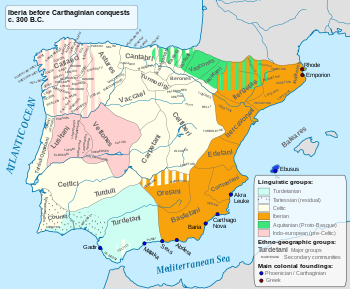Berones

The Berones were a pre-Roman Celtic people of ancient Spain, although they were not part of the Celtiberians. They lived north of the latter and close to the Cantabrian Conisci[1] in the middle Ebro region between the Tirón and Alhama rivers.
Origins
[edit]The ancestors of the Berones were Celts[2] who migrated from Gaul to the Iberian Peninsula around the 4th century BC,[3][4] to settle in La Rioja and the southern parts of the Soria, Álava and Navarre provinces.
Location
[edit]
A stock-raising people that practiced transhumance, their capital was Varia or Vareia (Custodia de Viana; Celtiberian-type mint: Uaracos Auta?),[5][6] situated near Logroño at the middle Ebro in La Rioja. and controlled the towns of Libia (Herramélluri or Leiva – La Rioja), Tritium Megallum (Tricio), Bilibium (Bilibio, near Conchas de Haro – La Rioja) and Contrebia Leukade (Aguillar del Rio Alhama – La Rioja).
History
[edit]Allies of the Autrigones,[7] the Berones appear to have kept themselves out of the Celtiberian confederacy throughout the 3rd-2nd centuries BC but later came under pressure of the Vascones. Their earliest contact with Rome might have occurred during the early 2nd century BC, when they allegedly fought as allies of the Celtiberians at the battle of Calagurris in 186 BC, being defeated by the Praetor of Hispania Citerior Lucius Manlius Adicinus Fulvianus.[8]
According to a Roman epigraphic source, the Ascoli-Picenum bronze (ILS 8888, now at the Museo Capitolino, Rome),[9] Beronian mercenary cavalrymen later entered Roman service at the Social War (91–88 BC), fighting alongside other Spaniards in the Turma Saluitana[10] as auxiliary cavalry, under proconsul Gnaeus Pompeius Strabo in Italy. Despite this, the Berones subsequently aided their Autrigones' allies in the defence of their respective territories against Sertorius' incursion into northern Celtiberia in 76 BC.[11]
The Berones disappear as an independent people in the classical sources in about 72 BC, after the end of the Sertorian Wars, although some towns maintained their culture for a certain time due to a late Romanization.
See also
[edit]- Celtiberian confederacy
- Celtiberian script
- Celtiberian Wars
- Sertorian Wars
- Pre-Roman peoples of the Iberian Peninsula
Notes
[edit]- ^ Strabo, Geographikon, III, 4, 12.
- ^ Strabo, Geographikon, III, 4, 5.
- ^ Pliny the Elder, Naturalis Historia, III, 29.
- ^ Strabo, Geographikon, III, 4, 12.
- ^ Ptolemy, Geographiké Hyphegésis, I, 2, 6.
- ^ Strabo, Geographikon, III, 4, 12.
- ^ Livy, Periochae, 18.
- ^ Livy, Ab Urbe Condita, 39: 21, 6-10.
- ^ Criniti, N., L'Epigrape di Asculum di Gn. Pompeo Strabone, Milan 1970.
- ^ Fatás-Cabeza, G., La Sedetania - Las Tierras Zaragozanas hasta la fundación de Caesaraugusta, Zaragoza 1973a, pp.8.
- ^ Livy, Periochae, 91.
References
[edit]- Ángel Montenegro Duque et alli, Historia de España 2 – colonizaciones y formacion de los pueblos prerromanos, Editorial Gredos, Madrid (1989) ISBN 84-249-1013-3
- Francisco Burillo Motoza, Los Celtíberos – Etnias y Estados, Crítica, Grijalbo Mondadori, S.A., Barcelona (1998, revised edition 2007) ISBN 84-7423-891-9
- Leonard A Curchin (5 May 2004). The Romanization of Central Spain: Complexity, Diversity and Change in a Provincial Hinterland. Routledge. pp. 37–. ISBN 978-1-134-45112-8.
Further reading
[edit]- Daniel Varga, The Roman Wars in Spain: The Military Confrontation with Guerrilla Warfare, Pen & Sword Military, Barnsley (2015) ISBN 978-1-47382-781-3
- Philip Matyszak, Sertorius and the struggle for Spain, Pen & Sword Military, Barnsley (2013) ISBN 978-1848847873
- Ludwig Heinrich Dyck, The Roman Barbarian Wars: The Era of Roman Conquest, Author Solutions (2011) ISBNs 1426981821, 9781426981821
External links
[edit]- http://www.celtiberia.net
- http://www.montebernorio.com Archived 2015-08-06 at the Wayback Machine
